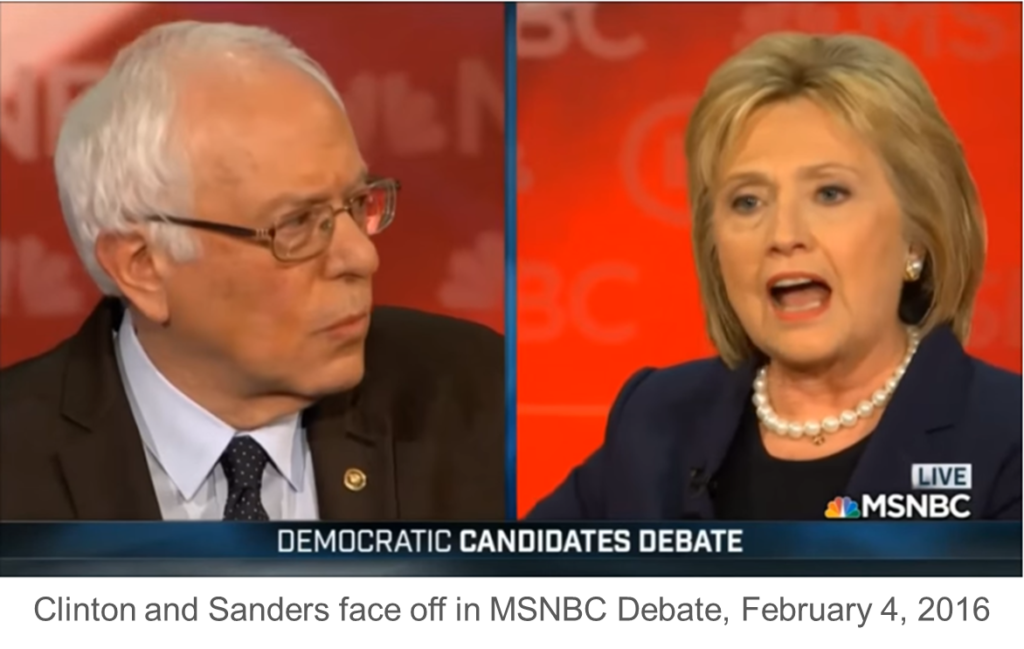Is Clinton starting to speak more like Sanders?

As the remaining presidential hopefuls geared up for today’s New Hampshire primary, Hillary Clinton seemed to be taking a page out of Bernie Sanders’ book, fueling her arguments to voters with the populist rhetoric her opponent has traditionally delivered.

For most of her campaign, Clinton has presented herself as the more practical candidate—the one who, once the “Bern” wears off, is in a better position to get things done in the White House (Politico). But, as Sanders has chipped away at the former Secretary of State’s polling lead—nearly robbing her of the win in Iowa—it sounds like Clinton may be ready to change the story.
At Quantified Communications, we’ve been using our proprietary communication analytics platform to track the presidential frontrunners’ rhetoric since the beginning of the race. We wanted to see just how much Clinton’s language has shifted to match Sanders’, so we compared both candidates’ earliest campaign speeches to their most recent engagements. Here’s what we found.
Clinton has adopted her opponent’s indignation
Bernie Sanders has been well known from the start of his campaign for blunt remarks and anger-fueled stump speeches that have helped voters feel connected to him. Meanwhile, Clinton’s reliance on her experience and logistical mastery has kept her, for many, at arm’s length. But as the Iowa caucus approached, voters noticed something: she’d started to get angry (Austin American-Statesman). She’d started using language we might expect from Senator Sanders to showcase her indignation with the country’s current state of affairs.
The data from our analysis of Clinton and Sander’s recent engagements supports the public’s intuition: The former secretary of state used 69.6% more language indicating anger in last week’s debate than in the first. What’s more, her use of negativity has risen steadily over the course of the campaign. Whereas in the first debate, Clinton used 23.1% less negative language than her opponent, she spoke with 9.4% more negativity than Sanders during the Iowa Town Hall last month, and nearly matched him in last week’s debate.

Clinton’s newfound edge was sharpest when she directed it at her opponent last Thursday evening, leveraging Sanders’ own push for a positive campaign to bluntly, crisply shut down his criticisms:
You know, Senator Sanders has said he wants to run a positive campaign. I’ve tried to keep my disagreements over issues, as it should be. But time and time again, by innuendo, by insinuation, there is this attack that he is putting forth […] And I just absolutely reject that, Senator. And I really don’t think these kinds of attacks by insinuation are worthy of you. And enough is enough. If you’ve got something to say, say it directly.
Clinton’s increased authenticity may help capture voters’ hearts
More than any other candidate’s, Clinton’s authenticity has been questioned again and again as she’s been criticized for her overly calculated language. But lately, as she’s attempted to shift from the purely practical candidate to one whom—like Sanders—voters can really identify with, Clinton’s use of language demonstrating authenticity has skyrocketed.

This increase in authenticity can be attributed largely to Clinton’s newfound willingness to open up on a personal level, as she did in last week’s Town Hall debate when Rabbi Jonathan Spira-Savett asked her how she balances the ego and humility that are both so necessary for the presidency:
This is hard for me. You know, I never thought I’d be standing on a stage here asking people to vote for me for president. […] I never thought I would do this. And so I have had to come to grips with how much more difficult it often is for me to talk about myself than to talk about what I want to do for other people.
Moments like these—moments in which Clinton allows voters to glimpse her vulnerabilities and empathize—may go a long way in making those emotional connections with voters.
Whether the changes Clinton has made to her approach will be enough to catch up to Sanders’ commanding New Hampshire lead remains to be seen. But you can be sure we’ll be watching closely as the race continues.
To learn more about how we can help your team use analytics to evaluate and strengthen your communications, contact us at info@quantifiedcommunications.com.